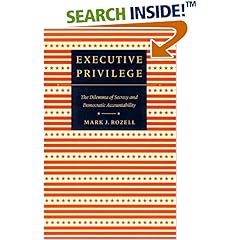Bush and the Case of Executive Privilege
President Bush and Congress appear headed toward a clash over whether White House aides can be forced to testify before a legislative committee. If pushed hard by the Democrats, it appears that Bush will claim executive privilege and revive a national debate over a constitutional principle most commonly associated with Watergate and the Lewinsky scandal. Why would the president want to do that?

In the Nixon case, the Supreme Court forced the president to turn over the White House tapes that implicated him in the Watergate scandal and ended his presidency. In the Lewinsky case, President Clinton lost a number of executive privilege battles with Kenneth Starr over efforts to withhold documents and testimony by officials. But in these famous battles, Presidents Nixon and Clinton faced special prosecutors who were able to make a showing to the courts of a compelling need for information for the purpose of conducting criminal investigations.
The present controversy is much murkier because it involves a dispute between two branches rather than an intra-executive investigation. What generally happens in these battles between the president and Congress is that the two sides posture for a while, and then there is some accommodation reached before the matter goes to a court. Each side recognizes that it may have a lot to lose by going to court, and thus has an incentive to cut a deal.
But in some cases, one side merely backs down. In these situations, it is more politics, than the law, that settles the matter. If Congress were still controlled by the Republicans, for example, we would not even be having this debate right now.
What then might hamper the Democrats, who seem to have an edge given the president’s low public support and widespread anger over the controversial firings? In part, if the public perceives Congress as overly vigilant about investigations, but not doing enough about, for example, Iraq, the whole effort to compel testimony could become a symbol of Congress’s failure to read the mandate from the 2006 elections. Members of Congress may believe that an important principle is at stake, but how far will they go if they find that public opinion is not supportive of their efforts and that pushing hard ultimately hurts the party’s electoral prospects next year?
President Bush makes the claim that the president has the right to candid advice from his closest White House aides. On that point he is correct and there is ample constitutional precedent for a president to protect internal deliberations. When confronted with a threat of a congressional subpoena to compel testimony by a White House aide, President Dwight Eisenhower famously said (in 1954) “any man who testifies as to the advice that he gave me won’t be working for me that night.” Ike went on to say that a close White House aides’ work “is really a part of me and he’s not going up on the Hill.” The Washington Post weighed in with editorial support for the president’s view and at one point said that the president’s right to withhold information and testimony from Congress “is altogether beyond question.”
What is puzzling in the current controversy is that President Bush says that, although he will not allow official testimony, he is nonetheless willing to allow certain aides to speak with congressional investigators privately. If the president is serious about protecting candor in the White House, he should have taken a firm stand and said that, like Eisenhower before him, he will not allow Karl Rove and others to testify. If he believes in the principle that he is claiming, then he should assert executive privilege, and even allow the battle to go to the courts where he very well may win.
Related Links
HNN Hot Topics: Executive Privilege
